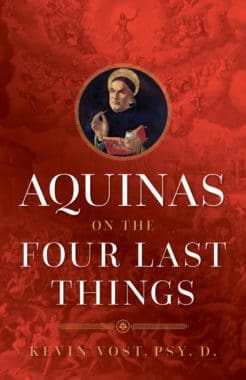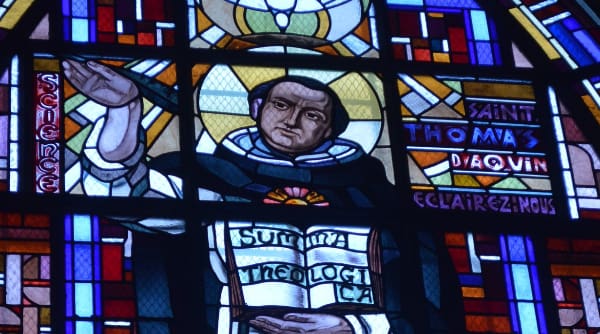Even as we hold by faith that the last end of
man’s life is to see God, so the philosophers maintained
that man’s ultimate happiness is to understand
immaterial substances according to their being.
— ST, Supplement, 92, 1
Will the glorified human intellect be able to see God in His essence?
This question has proven quite taxing to the not-yet-glorified intellects of many of God’s brightest and most devout theologians over the centuries. Thomas provides a full sixteen objections (the most of any article in his “Treatise on the Resurrection”) to the idea that the blessed will see God in His essence. There are indeed many reasons to think that the saints in heaven, and even the highest of angels, can never attain the capacity to see “I am” (Exod. 3:14) as He truly is.
Even the first objection on its own seems formidable. John 1:18 tells us that “no one has ever seen God,” and St. John Chrysostom commented that “not even the heavenly essences, namely the Cherubim and Seraphim, have ever been able to see Him as He is.” We are promised equality with the angels, since we read in Matthew 22:30 that those in heaven “are like the angels,” indeed, “equal to angels” (Luke 20:36). If the angels cannot see God in His essence, then neither can the saints.
Other objections get very philosophically and theologically nuanced. I’ll highlight the bottom lines of just a few: Dionysius wrote that knowledge pertains to existing things, which are finite. Since God is infinite and above all things, He is above all knowledge, and we can never know Him. Further, Dionysius wrote that “God is invisible on account of His surpassing glory.” Now, since God’s glory surpasses the human intellect “on the way” (here on earth), it will surpass our glorified intellects in heaven; furthermore, as He is invisible on the way, so too will He be invisible in heaven.
Thomas begins his response to the objections with a veritable barrage of scriptural passages, including the following:
- “For now we see in a mirror dimly, but then face to face” (1 Cor. 13:12). To see something face-to-face is to see it in its essence. “Therefore,” Thomas says, “God will be seen in His essence by the saints in heaven.”
- “When he appears we shall be like him, for we shall see him as he is” (1 John 3:2).
- “He who loves me will be loved by my Father, and I will love him and manifest myself to him” (John 14:21).
Thomas elaborates that the desire of the saints cannot be frustrated, and it is the common desire of all the saints to see God in His essence, as Scripture repeatedly reveals:
- “Show me Thy glory” (Exod. 33:13).
- “Show Thy face and we shall be saved” (Ps. 80 [79]:19).
- “Show us the Father and it is enough for us” (John 14:8).
Thomas then elaborates with the quotation that opened this chapter. We hold by faith that our last end, our highest good, our complete fulfillment and happiness, consists precisely in seeing God. Our intellects will indeed attain the divine vision in heaven. “It remains, then, to examine how this may come about.” The examination that follows is truly fascinating, but might appear to some readers as abstract, abstruse, and unfamiliar as the two thinkers whom Thomas first cites: Alfarabius and Avempace.90 Readers who care (and dare) to dip into Thomas’s rich and de-tailed analyses may read question 92 of the Supplement. Here, I will keep things quite simple and summarize just a few of Thomas’s answers to just a few of the objections.
First, Thomas addresses the scriptural passages stating that no one has seen God, including, according to St. John Chrysostom, the angels. From Augustine, Thomas borrows three ways of explaining these words: (1) no one sees God with corporeal vision (that is, with the eyes, as opposed to intellectual vision), (2) the intellectual vision of God is excluded from those who still dwell in mortal flesh, or (3) “the vision of comprehension” is excluded from any created intellect.
Thomas believes that St. John Chrysostom refers to this third sense, since his commentary on John 1:18 says, “By seeing, the evangelist means a most clear perception, and such a comprehension as the Father has of the Son.” Thomas agrees that this is precisely what St. John the Evangelist meant, since he ended the same verse with the words “The only-begotten Son, who is in the bosom of the Father, he has made him known.” Thomas says John intends “to prove the Son to be God from His comprehending God.” In other words, those in heaven will, like the angels, see God face-to-face in His essence, but we will never fully grasp or comprehend Him as the Son does.
As for the objection that a finite intellect (even a glorified one) can never know an infinite object (God), Thomas replies that the vision whereby we will see God in His essence is, through God’s gift, “the same whereby God sees Himself, as regards that whereby He is seen, because as He sees Himself in His essence so shall we also see Him.” But a person can see more or less clearly depending on the power of his intellect, just as he can see an object, such as a simple stone, more or less clearly depending on his power of sight. Because our intellect is less powerful than God’s, “consequently in that vision we shall see the same thing that God sees, namely His essence, but not so effectively.”
As for God’s glory, “it does not surpass the Divine essence, which will be the form of our intellect in heaven: and therefore although it is invisible now, it will be visible then.” In other words, it will not exceed the capacity of our intellect.
+
This article is adapted from a chapter in Aquinas on the Four Last Things by Kevin Vost, which is available from Sophia Institute Press.

Art for this post on Saint Thomas Aquinas: Cover and featured image used with permission.




